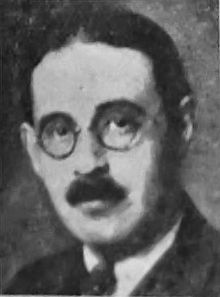Harold Laski
British academic (1893-1950)
Harold Joseph Laski (30 June 1893 – 24 March 1950) was an English political theorist and economist. He was active in politics and served as the chairman of the British Labour Party from 1945 to 1946 and was a professor at the London School of Economics from 1926 to 1950.

Quotes
edit- Who does not know Tocqueville cannot understand liberalism. A case of unanswerable power could, I think, be made out for the view that he and Lord Acton were the essential liberals of the nineteenth century.
- 'Alexis de Tocqueville', in F. J. C. Hearnshaw (ed.), The Social and Political Ideas of Some Representative Thinkers of the Victorian Age: A Series of Lectures delivered at King's College, University of London, During the Session 1931–1932 (1933), p. 100
- [L]iberalism has been, in the last four centuries, the outstanding doctrine of Western Civilisation.
- The Rise of European Liberalism: An Essay in Interpretation [1936] (1962), p. 5
- The German-Soviet pact was...a shameless exhibition, on Stalin's part, of complete indifference to the fate of the working-class outside the Soviet Union: and the attack on Finland, like the absorption of the Baltic Republics, was an example of strategic imperialism.
- Reflections on the Revolution of Our Time (1943), p. 87
Quotes about Laski
edit- You have no right whatever to speak on behalf of the Government. Foreign affairs are in the capable hands of Ernest Bevin. His task is quite sufficiently difficult without the irresponsible statements of the kind you are making ... I can assure you there is widespread resentment in the Party at your activities and a period of silence on your part would be welcome.
- Clement Attlee to Harold Laski (1946), quoted in David Butler and Gareth Butler, Twentieth Century British Political Facts (2005), p. 289
- I come now to the question of diplomatic personnel... It is said that I am admitting to the service Eton and Harrow. I am not one of those who decry Eton and Harrow. I was very glad of them in the Battle of Britain—by God, I was!—those fellows paid the price in the Royal Air Force on those fatal days. If the Universities are to be criticized, well, put up a vote of censure on Harold Laski, because it is the product of the Universities I have got to accept.
- Ernest Bevin, Speech to the Labour Party Conference in Bournemouth (12 June 1946), quoted in British Information Services, British Speeches of the Day, Vol. IV (1946), pp. 423-424
- If Laski was not, in any ordinary sense of the word, a politician, he was also no thinker. He had an unbounded verve and versatility in the acquisition of knowledge. But, where he skimmed everything, he never plunged deep. The extent of his reading was colossal, even if one assures that he did not more than turn the pages of some of the works which he mentions.
- E. H. Carr, "Harold Laski" (1953), published in From Napoleon to Stalin and Other Essays (1980)
- When I first called on Professor Harold Laski, he expressed the opinion that I ought to take some comfort in the vindication anarchism had received by the Bolsheviki. I agreed, adding that not only their régime, but their stepbrothers as well, the Socialists in power in other countries, had demonstrated the failure of the Marxian State better than any anarchist argument. [...] In America I had never met such lack of response to any appeal. Laski thought I would find even the most radical elements reluctant to oppose the Bolsheviki. They were too enthusiastic about the Revolution to draw lines of demarcation. In time I might interest the labour ranks. He would do his best to aid me; he would invite his friends for the next Sunday afternoon to hear my story. Once more hope sprang from what seemed a hopeless and futile quest.
- Emma Goldman, Living My Life (1931)
- He was still in his late twenties and looked like a schoolboy. His lectures on the history of political ideas were brilliant, eloquent, and delivered without a note; he often referred to current controversies, even when the subject was Hobbes's theory of sovereignty.
- Kingsley Martin, Editor: A Second Volume of Autobiography, 1931–45 (1968), p. 94
- His lectures taught more, much more than political science. They taught a faith that ideas mattered, that knowledge was important and its pursuit exciting.... His seminars taught tolerance, the willingness to listen although one disagreed, the values of ideas being confronted. And it was all immense fun, an exciting game that had meaning, and it was also a sieve of ideas, a gymnastics of the mind carried on with vigour and directed unobtrusively with superb craftsmanship. I think I know now why he gave himself so freely. Partly it was because he was human and warm and that he was so interested in people. But mainly it was because he loved students, and he loved students because they were young. Because he had a glowing faith that youth was generous and alive, eager and enthusiastic and fresh. That by helping young people he was helping the future and bringing nearer that brave world in which he so passionately believed.
- Ralph Miliband, quoted in Michael Newman, Ralph Miliband and the Politics of the New Left (2002), p. 22
- [S]omeone who is a Socialist by allegiance and a Liberal by temperament.
- George Orwell, 'Revolt in the urban desert', The Observer (10 October 1943), quoted in The Complete Works of George Orwell: Two Wasted Years, 1943, eds. Ian Angus and Sheila Davison (1986), p. 270